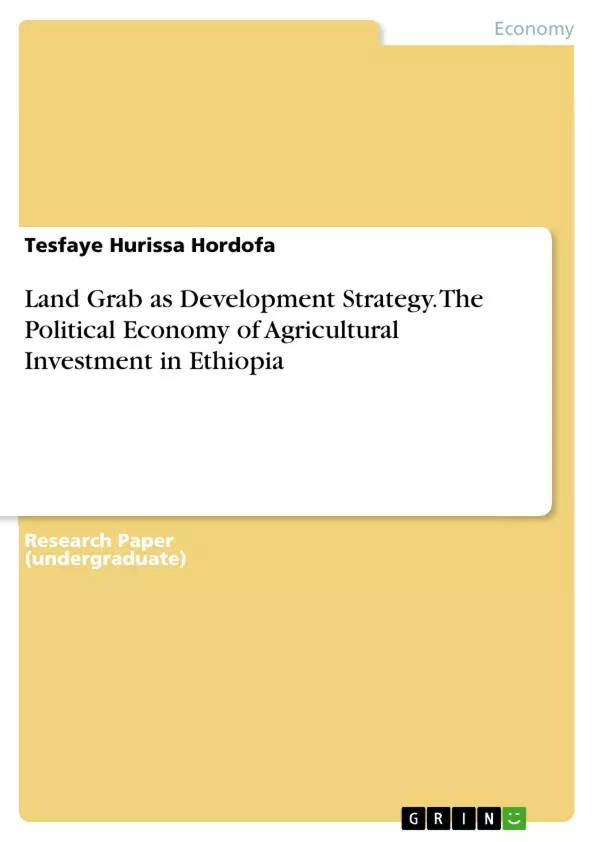This paper analyzes Tom Lavers' 2012 article titled "Land grab' as strategy? The political economy of agricultural investment in Ethiopia", which explores the relationship between agricultural investment and land acquisition in Ethiopia.
The paper argues that foreign investment in agricultural land has become a key strategy for the Ethiopian government to transform the country's economy and agriculture sector. The article critically examines this strategy by focusing on the political economy of large-scale agricultural investment, highlighting the key actors involved in the process, and the implications of such strategy for small farmers and the broader Ethiopian society. The paper also highlights the various critiques and controversies surrounding large-scale agricultural investment in Ethiopia, including issues related to land acquisition, land tenure, environmental degradation, and social displacement.
Table of Contents
- Summary
- Introduction
- Focus or objective of the article
- Discussion as related to: topic of land grabbing as a development strategy in Ethiopia.
- A. The author or authors believes/believe and argues/s about
- B. Other authors or scholars believe and argue about the topic?
- C. My personal position.
- Summary of main finding.
- A.Conclusion
- B. Does it have relevance to Ethiopian situation and why?
- References
Objectives and Key Themes
This article examines the political economy of large-scale agricultural investment in Ethiopia, often referred to as "land grabbing," and its impact on development. The author argues that this strategy, while promoted as a way to modernize Ethiopian agriculture and boost food security, may ultimately have negative consequences for local communities and the overall Ethiopian economy.
- The impact of foreign investment in Ethiopian agriculture, particularly large-scale land acquisitions.
- The political and economic factors driving these investments, including the role of the Ethiopian government and international agencies.
- The social and environmental consequences of land grabbing for local communities, including displacement, loss of livelihoods, and environmental degradation.
- The broader implications of this phenomenon on the social, economic, and environmental aspects of Ethiopia.
- The need for alternative approaches to agricultural development that prioritize the needs and local knowledge of farmers and pastoralists.
Chapter Summaries
- Introduction: This chapter introduces the article's central theme, which is the controversial issue of land grabbing in Ethiopia and its potential impact on development. It highlights the rapid increase in foreign investment in Ethiopian agriculture, particularly in the form of large-scale land acquisitions or 'land grabs'. The authors argue that these investments are often presented as necessary for modernizing Ethiopian agriculture and improving food security but may have negative consequences for local populations and the broader Ethiopian economy.
- Focus or objective of the article: This chapter examines the political economy of large-scale agricultural investment in Ethiopia, known as "land grab," and its broader implications on the social, economic, and environmental aspects of Ethiopia. The author challenges the dominant ideology that portrays "land grab" as a means to promote economic growth and development while prioritizing the needs of investors over the needs of local communities.
- Discussion as related to: topic of land grabbing as a development strategy in Ethiopia: This chapter delves into the debate surrounding land grabbing as a development strategy in Ethiopia. It discusses the arguments of critics who see land grabbing as leading to displacement, environmental degradation, and exploitation of workers, as well as those who argue that it offers new opportunities for employment and economic growth. The chapter also focuses on the political economy of agricultural investment in Ethiopia, examining the complex web of political and economic interests involved in land grabbing and its impact on development outcomes.
Keywords
This article focuses on the political economy of agricultural investment in Ethiopia, particularly large-scale land acquisitions or "land grabs." Key themes include the impact of foreign investment, the role of government policies and international agencies, the social and environmental consequences for local communities, and the need for alternative development approaches.
Frequently Asked Questions
What is "Land Grab" in the context of Ethiopia?
It refers to large-scale agricultural land acquisitions by foreign investors, which the Ethiopian government uses as a development strategy.
Why is the Ethiopian government pursuing this strategy?
The goal is to modernize the agriculture sector, transform the national economy, and theoretically improve food security through foreign capital.
What are the main critiques of large-scale agricultural investment?
Critiques focus on social displacement of local communities, loss of livelihoods for small farmers, environmental degradation, and issues with land tenure.
How does the author view the political economy of these investments?
The author argues that the strategy often prioritizes the needs of international investors over the needs of local communities and smallholder farmers.
Does "Land Grab" actually help food security?
While promoted as a solution, the paper suggests it may have negative consequences for local food systems and lead to social displacement.
- Citation du texte
- Tesfaye Hurissa Hordofa (Auteur), 2023, Land Grab as Development Strategy. The Political Economy of Agricultural Investment in Ethiopia, Munich, GRIN Verlag, https://www.grin.com/document/1356944



